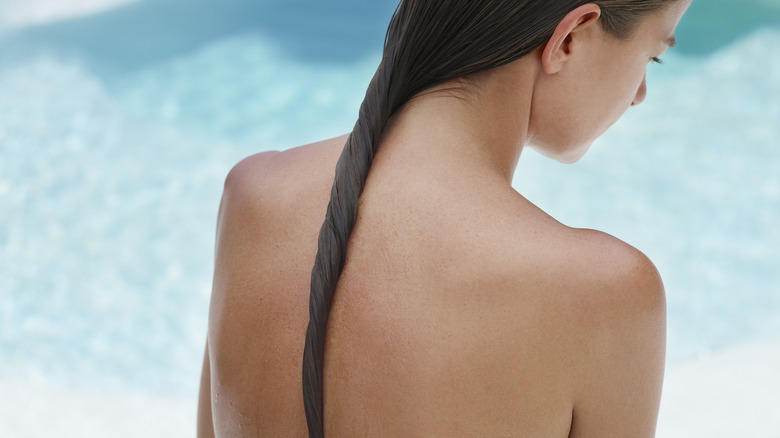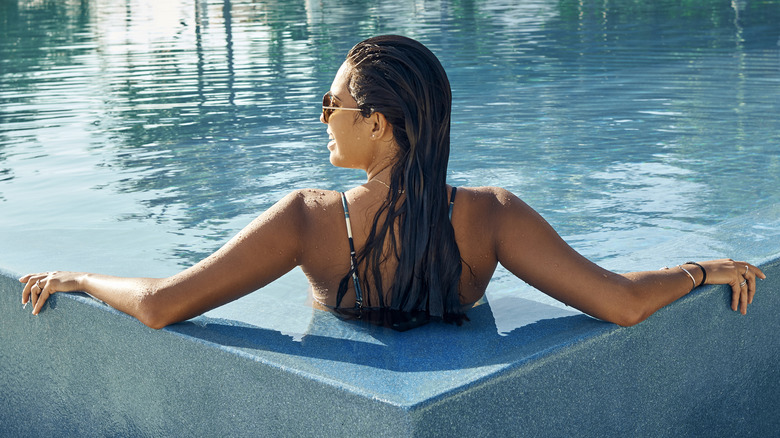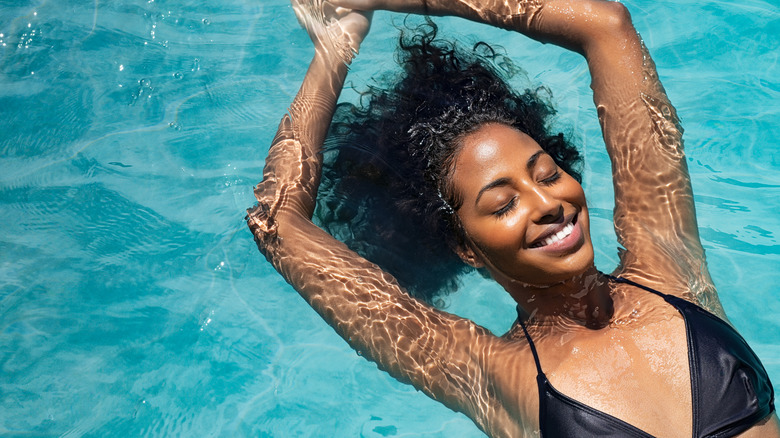Here's How To Get Chlorine Fully Out Of Your Hair After A Dip In The Pool
We all know chlorine is put into swimming pools to keep it clean and ready for use, but what most of us don't tend to think about is exactly what that cleaning chemical is doing to our hair. It turns out, chlorine can wreak some serious havoc on our locks, creating damage that's difficult to undo — particularly if you're an avid swimmer. Some of the negative effects chlorine can have on hair include drying it out, leaving it dull and lifeless, weakening it and creating split ends, and even dulling its color. In some scenarios, chlorine can even change the color of your hair. If you have lighter locks, you may have noticed your hair develop a green tint after a lot of time in the water.
Though enjoying a dip in the water every now and then probably won't have too much of an effect, there are people who are more susceptible to chlorine damage than others. They include people with hair that's already dry or damaged, people with colored hair, or people with thin hair. That's why we'd recommend putting on a swim cap if heading into the water regularly.
But don't worry if a swim cap isn't your thing or if the damage is already done, because there are ways to rescue your tresses from the chlorine monster before it's too late. Here's exactly how to rid your hair of all those chemicals.
Taking care of your hair starts before even stepping into the pool
Ridding your hair of chlorine doesn't just start when you step out of the pool. It actually begins before you even get in. One of the first steps you can take is by rinsing your hair with water you know doesn't contain chlorine before you get in. The reason this works is because your porous hair will absorb the clean water, leaving less room for it to absorb the pool water. You'll then want to repeat this step after you get out of the pool, cleansing your 'do of any pool water that may have been absorbed.
There are a few other things you can do before heading into the water, too. Applying natural oils to your hair before getting in the water can protect it from chemicals, as they create a layer chlorine will struggle to penetrate; Coconut oil is particularly good for this. "Because coconut oil is a larger oil molecule than many other oils, it will sit on the surface of the hair where it can act as a barrier, rather than penetrating into the hair shaft," colorist and color educator Rex Jimieson told Byrdie.
Deep conditioning masks and leave-in conditioners can also work too. If your pool doesn't allow oils or conditioners on your locks, then you could instead try a pre-swim hair spray to prevent chlorine penetration. They can often contain Vitamin C and some can also be used on the skin.
Choose chlorine-targeting products to wash your hair
When you wash your hair after a pool session, the best way to get rid of all the chlorine is to use products specifically designed to rid your locks of the chemical. Clarifying shampoo will help to give your hair a deep cleanse following a swim, but for more everyday use, sulfate-free shampoos and conditioners will help clean your hair without damaging it further. We'd also recommend washing your hair immediately after being in the pool water so it has less time to penetrate your strands, and washing it multiple times until your head feels properly clean.
Looking for something more natural? You could make your own hair mask to rid your hair of extra chemicals. It's simpler than you think, too! All you have to do is mix a single tablespoon of baking soda with a cup of water. Wash your hair using the solution, and then use your regular shampoo and conditioner (or one specific for chlorine) after.
Another way to rid your hair of chlorine and help reverse any damage is to use a deep conditioner twice a week. Not only will this help make your locks feel cleaner and smoother, but it will also bring some of the moisture back to your strands which chlorine may have stripped out. It'll also go some way to preventing further damage.


